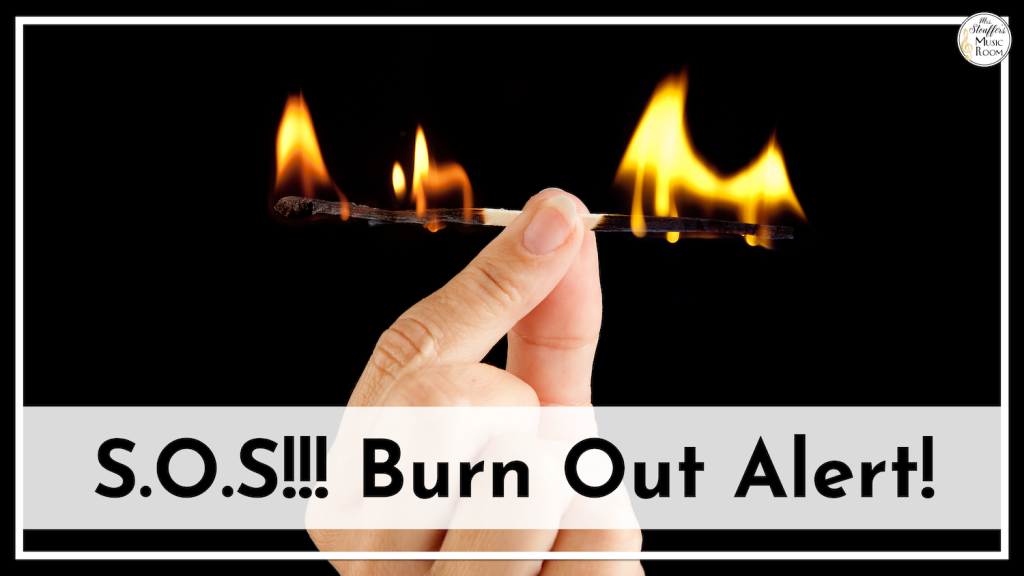
Burn out is a terrible thing that I think a lot of teachers face at one point or another. Add in a situation where you teach several grade levels (Read: ALL the students in the school), have your skills put on display in the form of performances, and sometimes get the short end of the stick with extra duties so classroom teachers can have extra time, and it’s a recipe for Burn Out. Then add a pandemic on top of it.
S.O.S!!! Burn out alert!
Here’s a few signs you are at S.O.S. stage:
- Impatient/irritable – are you short with everyone or easily irritated?
- Dread – does the thought of anything that you are responsible for fill you with dread?
- Lack of energy or trouble sleeping – How many cups of coffee or tea are you having to combat this? Are you drowsy all day?
- Unmotivated and or unproductive: You don’t want to get stuff done, or you struggle to get it done.
- Doubt, feeling down on yourself, feeling lonely or detached
- Hard to concentrate or focus – if you are all over the place and can’t focus, especially on work.
- Physical symptoms: tight muscles, digestive issues, high blood pressure, headaches, or more
- Read some more signs of job burnout from The Mayo Clinic
I’ve seen so many teachers talk about it and I know I’ve faced it several times. We set ourselves up in unsustainable situations or take on too much. Sometimes we don’t have a choice. Long term solutions are more complicated but in the S.O.S. Burn Out Alert! phase, you need solutions, FAST. Here’s some things you can do to immediately combat burn out.
What to do when you’ve hit the wall
Reach Out & Speak Up
- Get support from your friends and family: First, apologize if you’ve been less than kind to your most important people. Then ask them for help to pick up the things that you can’t cover. Can your significant other cook dinner or prep lunches? Can your kids pick up some of the basic household chores? Can you just let something go for a while?
- Get support: Inform your admin (if they are the supportive type): Let them know you are struggling and ask for support. It’s better than dropping the ball and facing consequences later. Ask for help delegating, picking up something, or taking something off your plate to get you out of crisis mode. If you have a less than supportive admin, perhaps seeking help with your colleagues will be less stressful.
- Get support from your coworkers: This one can be tricky depending on what you want to divulge as can reaching out to an admin, but chances are you have at least one person you work with that you really trust. Let them know you are struggling. If you are more comfortable, tell coworkers you cannot take on anything else. Delegate things you usually take care of. Don’t get bullied into teaching Kindergarten the rules of vowels in song form that they can perform for their families in two weeks. Support doesn’t always mean help. It can mean giving you tools to be successful, or not adding to your plate. If you have to take something on, ask what they can do to help you.
- Seek Parent Help: Parent volunteers are GOLD. And classroom teachers use them all the time. But music teachers aren’t the type to seek out parent help because we don’t know what to have them do. This post has several ideas to get parents involved in your classroom without worry about musical knowledge. If you can get even a few to help pick up the things that you want to do but don’t need to do, parents will really help you out. I bet some of the techy-type parents would even help you input things online like musical notation, or a Bitmoji classroom. They make great resources for substitutes so if you haven’t built one, this would take some of the load off on sub days.
Eliminate
- Drop something: At bare minimum, get rid of something that is not necessary. Is it an absolute need to change your bulletin board monthly? Is it necessary to make cute manipulatives, laminate and cut them out? Do you really need to write your own program or can you buy one?
- Construct time to get stuff done: Take a day and run activities the students don’t need you to supervise. Let them do that while you take care of as much as you can in your classroom. Informative movies (science of sound, composers/music history), listening activities and responses, composing activities (if you’ve done them before), especially in groups. One of my favorite EASY composing activities is to send the students off with a topic, and boomwhackers. They have to create a song using text, boomwhackers, and notate it. If you give them a theme and small groups, they’ll work all class period. Interactive games, twenty questions (instruments) in small groups, and write the rooms are all good activities to let the students have a few minutes while you take care of something else. Make one student the designated question answer-er and see if that can help deflect some of the questions.
- TAKE A DAY OFF: I know sub plans are awful, but by this point in the year, you’ve got all the basic info down so write some SERIOUSLY easy plans and stay home. Use your emergency plans. Or pick a movie, grab a few books and reflection worksheets or some music listening worksheets and take a day off at home. Get some of your necessary things done if it makes you feel better. Or take the day and do some serious self care. Sleep in, drink a bunch of water, eat something soothing, and get some light exercise like a walk or an easy bike ride. Or go find a punching bag and let loose. Maybe take a friend and go to one of those trendy ax throwing places (super fun and such a good stress release).
- Delete emails. Clear the box. Unless you need to reply to it, get rid of it so you don’t have 50+ emails staring you in the face every time you log in. If you need to move things you want to save to a “Save for later” folder, do it. It doesn’t seem like a lot but it can really clear your mind if you don’t see a huge list of things you have to do.
Add
I know adding anything sounds overwhelming but these are some things that can help give some immediate relief.
- Exercise: Even if you have to break it up, get some cardio. The movement will release some stress and getting the blood pumping can help your body if it’s feeling like it’s in crisis mode.
- Add some Mindfulness activities to your day: Sometimes stress management techniques can help in the moment. Grounding activities are wonderful for when you are in stressful moment. Some of these won’t work when there are students in the room but you could do a quick breath focus with the students for one minute if they are in need of a reset as well. Here are some of my favorites:
- Breath focus – concentrate on your breathe. Breathe in for 4, hold your breath for 5 and breath out for at least 6. The key here is to make the other parts of the activity longer than how long you breathe in.
- List all the items you can think of on a topic: movies with Tom Hanks, classic TV shows, red foods, etc.
- Body scan: Take two minutes and sit in a relaxed position. Start at the top of your head and take note of what you notice. Is it hot/cold, relaxed/tense, or neutral? Take inventory of each part of your body as you move down your body.
- List what you are doing as you do it. Or what you see as you see it. Take note of it and let it go.
- Spell things: Your full name backwards, your address, your school’s address, names of family members or any mundane things you can think of.
- 5-4-3-2-1: Take a moment to notice your surroundings. Five things I can see. Four things I can feel. Three things I can hear. Two things I can smell. One things I can taste.
- Healthy food: It’s SO easy to grab what’s on the counter at work, stop at Starbucks or eat quick comfort food when you are in crisis mode but it’s definitely not what you should be reaching for. (And believe me, pre-pandemic Melissa was a couple dozen pounds heavier than I am now so I have absolutely been there.)
- Bring some healthy snacks to work. Leave them in your room or car. Get stuff that helps you soothe the stress but isn’t going to sabotage you completely.
- Meal prep. Even if it means you only prep lunches and continue to dive deep into the fridge for the rest of your meals, it will help you from ordering out, eating questionable cupcakes, or eating nothing at all and then binging later. At the least (what I do), I write out a menu for the week. It helps me in when I’m doing the “I dunno” in front of the fridge.
- Make sure your caffeine or evening juice is balanced with water. We’re setting realistic goals here.
- A Better Bedtime: Go to bed at a time that allows you enough sleep to function better. Turn off your devices sooner in the evening and don’t stare at a screen. Get super cozy, and add my favorite thing: a sleep mask. It always blocks out that little bit of extra light that wakes me up.
- Hobbies/fun time: If you’ve been neglecting your downtime, set a timer and make yourself decompress. I’m not good at this. If you want someone to check in for accountability, feel free to reach out.
I hope that this has given you some ideas to get through the S.O.S. stage. I can’t stress enough that if you are in crisis or contemplating suicide, please reach out to for help. The National Suicide Hotline is available 24/7
800-273-8255. I also urge you to reach out to a mental health professional for help.
Stay well friends



